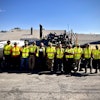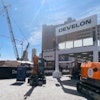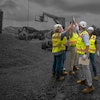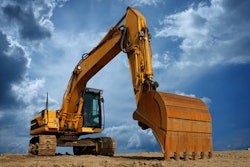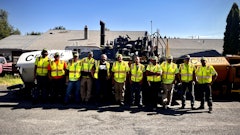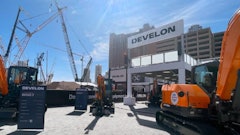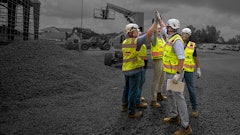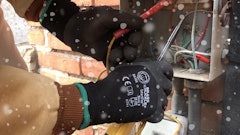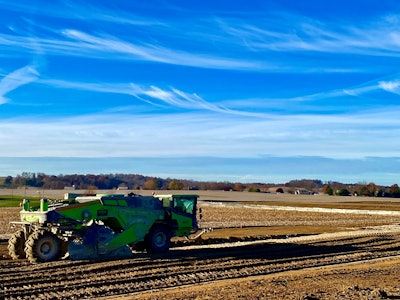
Celebrating over 70 years of stabilization does not happen by accident. Mt. Carmel Soil Stabilization, based in Illinois, consciously chose to be the contractor of choice in this niche business and their 300-person team works hard to educate their customers about their projects and the need for their services.
"We started out over a century ago, with sand and gravel works along the Wabash River, not far from our home town of Mt. Carmel, Illinois. Thirty years later, we began doing full depth reclamation on county roads. After another thirty years, we began expanding into lime and cement stabilization. And that’s where we have stayed until today – doing what we do best," Neil Ryan, president of Mt. Carmel Soil Stabilization says. "Nevertheless, our goal is to be even better in everything we do – and this is driven by our constant commitment to innovation and quality."
Today, Mt Carmel operates 20 crews across the country with more than 300 pieces of specialized equipment, all while touting the benefits of their services to their customers.
Education Comes First
Many contractors know what is best for their customers and the projects they are hired to complete but it takes education to make customers understand that the right fix might not even be one they have heard of before. Soil stabilization is the method of choice when it comes to assuring the load-bearing capacity and quality of soil in preparation for road construction and civil engineering projects, but many project owners don't know of the benefits this service provides.
The majority of Mt. Carmel's projects involve soil stabilization for roads and highways of all kinds and the preparation of sites for industrial developments, but it takes the dedication of their team to educate their customers and keep soil stabilization top of mind for customers and these projects.
"We work to convince customers that soil stabilization is the best choice based on the many benefits it provides," Kelly Crowder, vice president of equipment & facilities at Mt. Carmel Soil Stabilization says. "The method makes the replacement of soils with poor load bearing capacities more or less superfluous. Moving earth with excavators, loading it onto trucks, taking it away for disposal, and then trucking load bearing soil to the site and spreading it is a much more costly alternative. On most of our construction sites, we actually manage to make transportation distances even shorter. We stockpile materials like lime and cement at our ten decentralized depots strategically located across the Midwest of the United States."
And Mt. Carmel prides themselves on that. They routinely schedule and deliver over 6,000 tons of material per day to projects across the country just in time from their locations.
The company also prides itself on being a true partner with their customers, engaging them during the bidding process about the benefits their company provides.
"We engage in dialog with our customers as early as in the bidding phase and offer them our support," Crowder says. "This is because precise project planning based on laboratory analysis is a very important factor in soil stabilization measures. Our consulting services identify areas where costs can be reduced without compromising on quality – like in the choice of suitable construction materials in the ideal proportions and right quantities for the job. We offer lab analysis to help our customers understand what they are trying to accomplish with their projects."
This is mainly because soil stabilization can be seen as complicated service with many different goals. Stabilization remove moisture from a soil, increase the shear strength of a soil and/or control the shrink-swell properties of a soil, thus improving the load bearing capacity of a sub-grade to support pavements and foundations. To make sure everything is done correctly, Mt. Carmel uses an in-house testing service for their customers.
"It's important to complete testing on a site so we can determine the right chemicals needed to accomplish the goals of the project," Dane Redinger, director of engineering at Mt. Carmel says. "We partner with labs across the country to compete the testing, but we're analyzing the results and determining what chemical to apply in what area on the site and in what amount. This is a huge value add for our customers because it not only ensures the project will be successful, but is also the most cost-effective approach as not materials are wasted."
The staff at Mt. Carmel can also help troubleshoot projects during the design and construction phases to ensure projects go smoothly.
Trusted Partnerships
When it comes to the equipment contractors use, repeat purchases depend highly on machine performance and support. Mt. Carmel operates an extensive fleet of about 30 Wirtgen WR series cold recyclers, soil stabilizers, and Streumaster binding agent spreaders for the 500+ projects they complete each year. Mt. Carmel Stabilization works primarily with high-powered Wirtgen WR 240i machines because they know they can rely on their dependability and versatility for their broad range of needs.
"Our projects are extremely varied," Crowder says. "Some involve only a couple of meters and can be done in a day, while others can take months and need thousands of tons of lime and cement. All these contracts have had one thing in common over the past 14 years – Wirtgen soil stabilizers.
"As the guy responsible for our equipment, what interests me most about a construction machine is, of course, its availability for the job it’s supposed to do," Crowder continues. "Our WR 240i machines are rugged and reliable and do a fine job on every project. In the past, before we upgraded to WRs, we often took a pair of the machines we had along to the project site, because we never knew whether one alone would make it through a whole day. Today, we’re happy to have left that way behind us."
“These machines are absolutely unbeatable when it comes to versatility and durability,” Ryan adds. “One day, a team can be out on a soil stabilization project and, a day later, they can be granulating the asphalt of a road that needs repairing somewhere else – all with the same machine. And the productivity of the WR is high on both jobs.”

